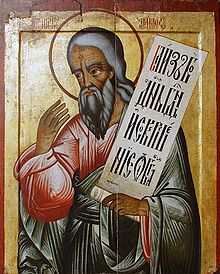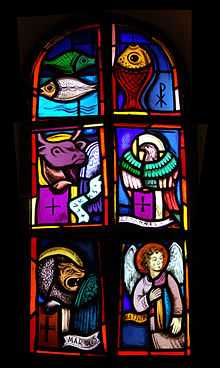Amos (prophet)
| Amos | |
|---|---|
 An 18th-century Russian icon of the prophet Amos (Iconostasis of Transfiguration Church, Kizhi monastery, Karelia, Russia). | |
| Prophet | |
| Born | Tekoa |
| Died | 745 B.C.E. |
| Venerated in |
Judaism Christianity Islam |
| Feast | June 15 (Orthodox) |
| Major works | Book of Amos |
Amos (/ˈeɪməs/; Hebrew: עָמוֹס , Modern Amos, Tiberian ʻāmōs) was one of the Twelve Minor Prophets. An older contemporary of Hosea and Isaiah, Amos was active c. 750 BCE during the reign of Jeroboam II, (786–746 BCE). He was from the southern Kingdom of Judah but preached in the northern Kingdom of Israel. Amos wrote at a time of relative peace and prosperity and neglect of religion. He spoke against an increased disparity between the very wealthy and the very poor. His major themes of social justice, God's omnipotence, and divine judgment became staples of prophecy. The Book of Amos is attributed to him.
Life
Before becoming a prophet, Amos was a sheep herder and a sycamore fig farmer.[1] Amos' prior professions and his claim "I am not a prophet nor a son of a prophet" (7:14) indicate that Amos was not from the school of prophets, which Amos claims makes him a true prophet. Amos' declaration marks a turning-point in the development of Old Testament prophecy. It is not mere chance that Hosea, Isaiah, Jeremiah, Ezekiel, and almost all of the prophets who are more than unknown personages to whom a few prophetical speeches are ascribed, give first of all the story of their special calling. All of them thereby seek to protest against the suspicion that they are professional prophets, because the latter discredited themselves by flattering national vanities and ignoring the misdeeds of prominent men.[2]
His prophetic career began in 750 BCE out of the town of Tekoa, in Judah, south of Jerusalem.[1] Despite being from the southern kingdom of Judah Amos' prophetic message was aimed at the Northern Kingdom of Israel, particularly the cities of Samaria and Bethel.[3]
Jeroboam II (c. 781-741 B.C.), ruler of the Northern kingdom, had rapidly conquered Syria, Moab, and Ammon, and thereby extended his dominions from the source of the Orontes on the north to the Dead Sea on the south. The whole northern empire of Solomon thus practically restored had enjoyed a long period of peace and security marked by a revival of artistic and commercial development. Social corruption and the oppression of the poor and helpless were prevalent. Many availed themselves of the throngs which attended the sacred festivals to indulge in immoderate enjoyment and tumultuous revelry. Others, carried away by the free association with heathen peoples which resulted from conquest or commercial contact, went so far as to fuse with the Lord's worship that of pagan deities.[4]
Amos is the first of the prophets to write down the messages he has received. He has always been admired for the purity of his language, his beauty of diction, and his poetic art. In all these respects he is Isaiah's spiritual progenitor.[2]
Amos felt himself called to preach in Bethel, where there was a royal sanctuary (vii. 13), and there to announce the fall of the reigning dynasty and of the northern kingdom. But he is denounced by the head priest Amaziah to King Jeroboam II and is advised to leave the kingdom. There is no reason to doubt that he was actually forced to leave the northern kingdom and to return to his native country. Being thus prevented from bringing his message to an end, and from reaching the ear of those to whom he was sent, he had recourse to writing. If they could not hear his messages, they could read them, and if his contemporaries refused to do so, following generations might still profit by them. No earlier instance of a literary prophet is known; but the example he gave was followed by others in an almost unbroken succession. It can not be proved that Hosea knew the book of Amos, though there is no reason to doubt that he was acquainted with the latter's work and experiences. It is certain that Isaiah knew his book, for he follows and even imitates him in his early speeches (compare Amos, v. 21-24, iv. 6 et seq., v. 18 with Isa. i. 11-15; Amos, iv. 7 et seq. with Isa., etc., ix. 7 et seq., ii. 12). Cheyne concludes that Amos wrote the record of his prophetical work at Jerusalem, after his expulsion from the northern kingdom, and that he committed it to a circle of faithful followers residing there.[2]
The apocryphal work The Lives of the Prophets records that Amos was killed by the son of Amaziah, priest of Bethel. It further states that before he died, Amos made his way back to his homeland and was buried there.[5]
Teachings
Two of his teachings are:
- Prayers and sacrifices do not make up for bad deeds.
- Behaving justly is much more important than ritual (Amos 5:21-24).
Feast day
On the Eastern Orthodox liturgical calendar, Amos' feast day is celebrated on June 15 (for those churches which follow the traditional Julian Calendar, June 15 currently falls on June 28th of the modern Gregorian Calendar). He is commemorated along with the other minor prophets in the Calendar of Saints of the Armenian Apostolic Church on July 31.
References
- ↑ 1.0 1.1 Coogan, Michael. A Brief Introduction to the Old Testament. Page 257. Oxford: Oxford University Press, 2009.
- ↑ 2.0 2.1 2.2 "Amos", Jewish Encyclopedia
- ↑ Dearman, J Andrew. Amos. Harper Collins Study Bible. Edited by Meeks, Wayne A. San Francisco: HarperCollins, 2006.
- ↑ Gigot, Francis. "Amos." The Catholic Encyclopedia. Vol. 1. New York: Robert Appleton Company, 1907. 11 Feb. 2014
- ↑ Anderson, Francis I., and David Noel Freedman, Amos, The Anchor Yale Bible, vol. 24A, New Haven: Yale University Press, 2008. Page 24.
Sources
 This article incorporates text from a publication now in the public domain: Easton, Matthew George (1897). "article name needed". Easton's Bible Dictionary (New and revised ed.). T. Nelson and Sons.
This article incorporates text from a publication now in the public domain: Easton, Matthew George (1897). "article name needed". Easton's Bible Dictionary (New and revised ed.). T. Nelson and Sons.
Further reading
- Anderson, Bernhard W. & Foster R. McCurley The Eighth Century Prophets: Amos, Hosea, Isaiah, Micah Wipf and Stock: 2003. ISBN 1-59244-354-0
- Anderson, Francis I. & David Noel Freedman, Amos, The Anchor Yale Bible, vol. 24A; New Haven: Yale University Press, 2008. ISBN 978-0-300-14070-5
- Rosenbaum, Stanley Ned Amos of Israel: A New Interpretation Georgia: Mercer University Press: 1990. ISBN 0-86554-355-0
- Lemmo, Peter S. & Greenblatt, Meriam "Glencoe Human Heritage: A World History" NY: McGraw-Hill Companies: 2004 ISBN 0078462401 (student ed.)
External links
- The Holy Prophet Amos – Orthodox icon and synaxarion
- Hypertext bible commentary: Amos
| ||||||||||||||||||||||||||||||||||||||
